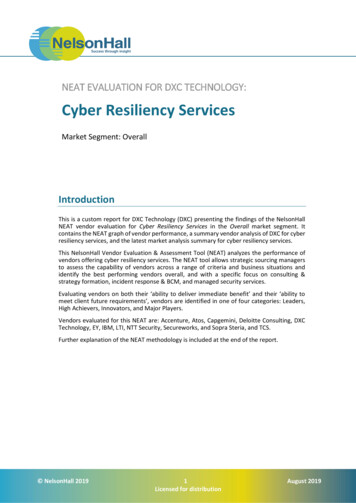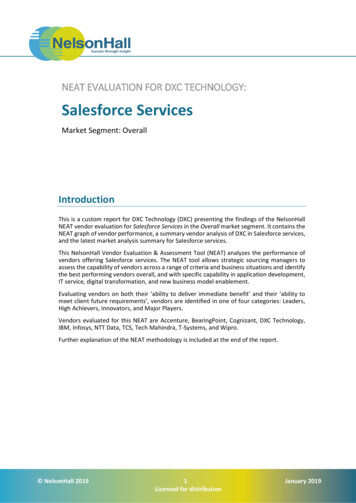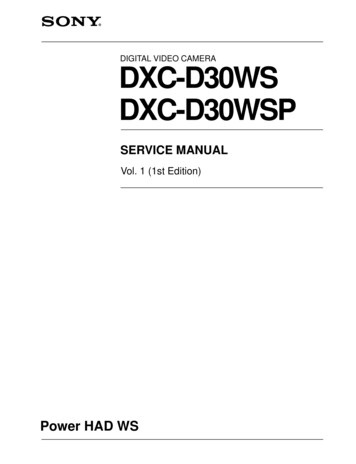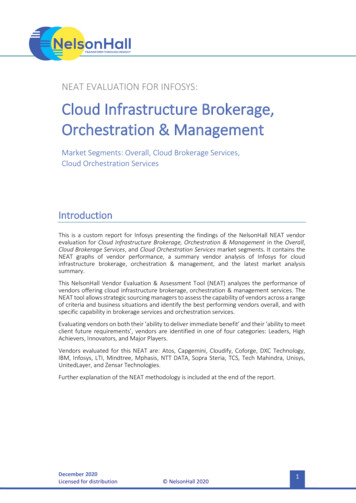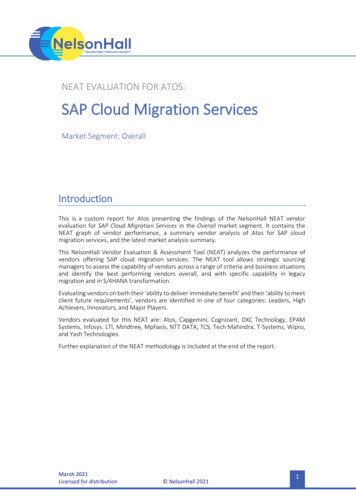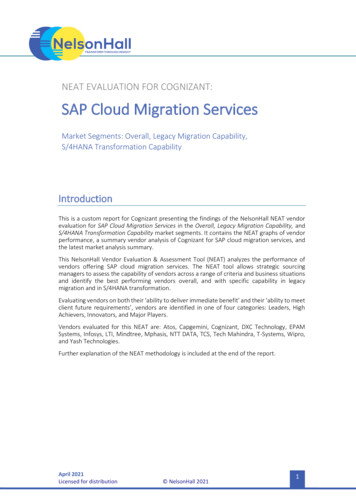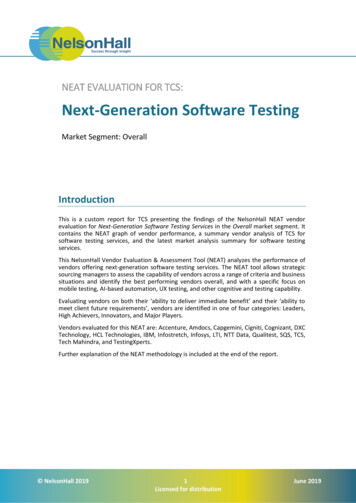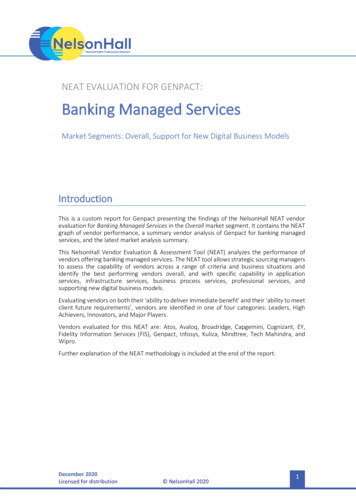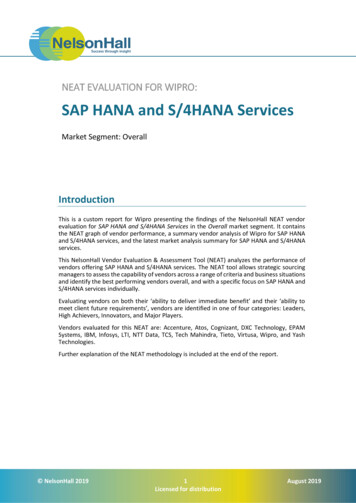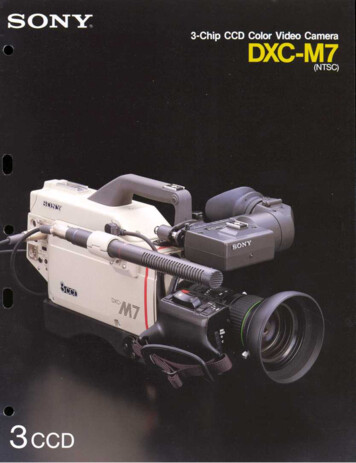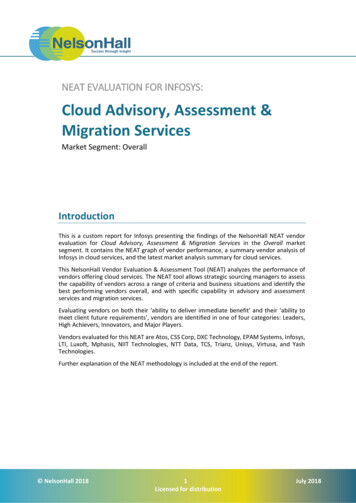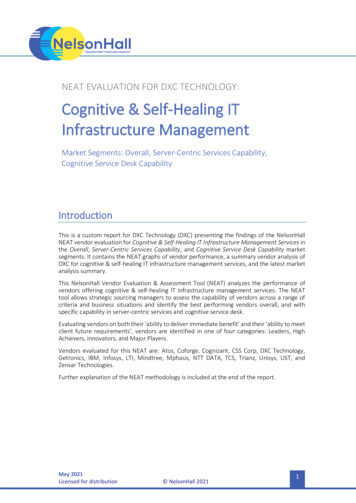
Transcription
NEAT EVALUATION FOR DXC TECHNOLOGY:Cognitive & Self-Healing ITInfrastructure ManagementMarket Segments: Overall, Server-Centric Services Capability,Cognitive Service Desk CapabilityIntroductionThis is a custom report for DXC Technology (DXC) presenting the findings of the NelsonHallNEAT vendor evaluation for Cognitive & Self-Healing IT Infrastructure Management Services inthe Overall, Server-Centric Services Capability, and Cognitive Service Desk Capability marketsegments. It contains the NEAT graphs of vendor performance, a summary vendor analysis ofDXC for cognitive & self-healing IT infrastructure management services, and the latest marketanalysis summary.This NelsonHall Vendor Evaluation & Assessment Tool (NEAT) analyzes the performance ofvendors offering cognitive & self-healing IT infrastructure management services. The NEATtool allows strategic sourcing managers to assess the capability of vendors across a range ofcriteria and business situations and identify the best performing vendors overall, and withspecific capability in server-centric services and cognitive service desk.Evaluating vendors on both their ‘ability to deliver immediate benefit’ and their ‘ability to meetclient future requirements’, vendors are identified in one of four categories: Leaders, HighAchievers, Innovators, and Major Players.Vendors evaluated for this NEAT are: Atos, Coforge, Cognizant, CSS Corp, DXC Technology,Getronics, IBM, Infosys, LTI, Mindtree, Mphasis, NTT DATA, TCS, Trianz, Unisys, UST, andZensar Technologies.Further explanation of the NEAT methodology is included at the end of the report. NelsonHall 2020May 2021Licensed for distribution1 NelsonHall 2021Licensed for distributionMarch 20201
NEAT Evaluation for DXC: Cognitive & Self-Healing IT Infrastructure ManagementNEAT Evaluation: Cognitive & Self-Healing ITInfrastructure Management (Overall)NelsonHall has identified DXC as a Leader in the Overall market segment, as shown in the NEATgraph. This market segment reflects DXC’s overall ability to meet future client requirements aswell as delivering immediate benefits to its IT infrastructure management services clients.Leaders are vendors that exhibit both a high capability relative to their peers to deliverimmediate benefit and a high capability relative to their peers to meet future clientrequirements.Buy-side organizations can access the Cognitive & Self-Healing IT Infrastructure ManagementServices NEAT tool (Overall) here.May 2021Licensed for distribution NelsonHall 20212
NEAT Evaluation for DXC: Cognitive & Self-Healing IT Infrastructure ManagementNEAT Evaluation: Cognitive & Self-Healing ITInfrastructure Management (Server-Centric ServicesCapability)NelsonHall has identified DXC as a Leader in the Server-Centric Services Capability marketsegment, as shown in the NEAT graph. This market segment reflects DXC’s ability to meetfuture client requirements as well as delivering immediate benefits to its IT infrastructuremanagement services clients, with specific capability in server-centric services.Buy-side organizations can access the Cognitive & Self-Healing IT Infrastructure ManagementServices NEAT tool (Server-Centric Services Capability) here.May 2021Licensed for distribution NelsonHall 20213
NEAT Evaluation for DXC: Cognitive & Self-Healing IT Infrastructure ManagementNEAT Evaluation: Cognitive & Self-Healing ITInfrastructure Management (Cognitive Service DeskCapability)NelsonHall has identified DXC as a Leader in the Cognitive Service Desk Capability marketsegment, as shown in the NEAT graph. This market segment reflects DXC’s ability to meetfuture client requirements as well as delivering immediate benefits to its IT infrastructuremanagement services clients, with specific service desk capability.Buy-side organizations can access the Cognitive & Self-Healing IT Infrastructure ManagementServices NEAT tool (Cognitive Service Desk Capability) here.May 2021Licensed for distribution NelsonHall 20214
NEAT Evaluation for DXC: Cognitive & Self-Healing IT Infrastructure ManagementVendor Analysis Summary for DXCOverviewDXC Technology operates 65 data centers in over 70 countries, servicing 6k clients. 55% ofits labor force operates in low-cost geographies in 27 global delivery centers. DXC hasstructured its organization around: Geographies: e.g., Americas, U.K./Ireland/Israel/Middle East/Africa, North and CentralEurope, Southern Europe, Australia/New Zealand, and Asia. Geographies have the primeresponsibility for account management and sales Offering Families: Modern Workplace, IT Outsourcing, Cloud and Security, Applications,and Analytics and Engineering Key Industries: Insurance, Healthcare & Life Sciences, Travel, Transportation andHospitality, Banking & Capital Markets, Aerospace & Defense, Consumer & Retail, Energy,Utilities, Oil & Gas, Manufacturing & Auto, Public Sector, Technology, Media &Entertainment, Telecommunications.This approach means that, for each major DXC Technology geography, each service line has aregional head, with P&L responsibility.IT modernization is DXC's approach to transformation with its clients. The enterprisetechnology stack is how DXC approaches the market, its clients, and partners. Its horizontalservices include IT outsourcing (i.e., IT infrastructure management) as the basis, and layeredon top of this is modern workplace (including desktop and collaboration support). It thenincludes cloud and security, including public, private, hybrid cloud, and applicationmaintenance and development. The final layer includes analytics and engineering, providingindustry expertise, analytics, and ML. These capabilities are offered across multiple industryverticals through full-stack provision in all areas.DXC's view is that this approach more accurately reflects how clients view their technologyjourney. DXC helps clients adopt hybrid cloud services that best align with their digitaltransformation strategies, including adopting agile and DevOps methodologies andembedding security in everything they do. DXC takes a consultative-led approach, working withclients to identify their key problems and the targeted outcomes they want. It takes an iterativeapproach where it seeks to test options with clients instead of a big-bang approach.The four key areas DXC focuses on to enable IT modernization for clients are: Time to market: helping clients move faster and get new services into the market quicker,including agile delivery models with continuous development and delivery Business agility: cloud adoption and cloud-native development, and applicationmodernization and data insights. DXC helps clients move from on-premise applications tothe public cloud; also, modernizing applications on public/private clouds, and developingnew applications and services in a secure cloud-native environment Secure growth: providing a foundation for secure growth and multi-cloud integration,platform management, and secure ecosystem. DXC looks to operate and secure hybrid atscale, including integrating and scaling on-premise and multi-cloud environments andmaking security and identity pervasive; also, enabling SRE, DevSecOps, and new operatingmodelsMay 2021Licensed for distribution NelsonHall 20215
NEAT Evaluation for DXC: Cognitive & Self-Healing IT Infrastructure Management Simplified operations: everything as a service, continuous optimization, and intelligentautomation supporting IT modernization. DXC looks to refresh the technology andarchitecture clients have in place and layer in automation and optimized applicationmanagement and IT operations. DXC looks to reduce costs and free up funding tomodernize other client estate areas to support new business initiatives.Across Cloud & Platform Services, DXC credentials include: 14k applications migrated to and managed in public/private cloud Managing 7.2m devices and 6m managed desktops, and 1.3m VDI 330k knowledge management articles 644k VMs and servers managed 2bn lines of code treated through app transformation factories 2.1m ERP users supported.NelsonHall estimates DXC has 5k resources in support of cognitive and self-healing ITinfrastructure management services. DXC also has 20k resources delivering data and analyticsservices. It also has 8k accredited and certified cloud resources globally. These include: 2k certified VMware professionals 2k Microsoft specialists 700 AWS professionals 550 certified ServiceNow resources.DXC has 400 resources within its global innovation and automation team focused ondesigning and engineering new products and capabilities to drive intelligent operations forclients’ mission-critical systems. This includes an innovation hub with an R&D type labenvironment used to experiment and prototype new ideas and determine proof-of-value.FinancialsDXC's CY 2020 revenues were 18.2bn. Of this, NelsonHall estimates 10% ( 1.8bn) isassociated with cognitive and self-healing IT infrastructure management services.NelsonHall estimates the geographical breakdown of DXC's cognitive and self-healing ITinfrastructure management services revenues in CY 2020 to be: Americas: 37% ( 685m) North and South Europe: 27% ( 500m) APAC: 21% ( 388m) U.K.I.: 15% ( 227m).May 2021Licensed for distribution NelsonHall 20216
NEAT Evaluation for DXC: Cognitive & Self-Healing IT Infrastructure ManagementStrengths Investing in IP, including Platform X, Actionable Moments, and technology ecosystem Expanding AI, analytics, and ML capabilities, including with Infinia ML Integrated delivery model across all layers of the stack (apps, platform, and infrastructure),including dedicated DevSecOps, and site reliability engineering resources Large IT infrastructure services client base across multiple sectors Extensive partner ecosystem (particularly Microsoft, ServiceNow, and AWS) Developing XLAs to improve UX and business outcomes Investment from the top to drive Platform X capabilities at scale Global cloud footprint across multiple industry verticals.Challenges Recruitment and retention of high-performing talent, considering recent workforcereduction programs; and attracting next-generation talent Needs to expedite digital reskilling initiative across the company Increasing site reliability engineering resources (SRE) Transitioning clients from legacy platforms will take time Ramping AI and ML capabilities in support of Platform X.Strategic DirectionDXC Technology is looking to expand its cognitive and self-healing IT infrastructuremanagement services capabilities through the following initiatives over the next 12-18months:Investing in IP and accelerators Investing in its Platform X service delivery platform and supporting IP and partnerecosystem integration (e.g., enabling ServiceNow's Integration Hub functionality tointegrate to other tools using out-of-the-box ServiceNow APIs/Spokes, and ServiceNow'sIntegration and Reconciliation engine (IRE) to provide a centralized framework toconsolidate data. DXC plans to focus on more partner-integrated solutions Focus on AIOps and partnership with Infinia ML for advanced machine learning and dataanalytics Expanding XLA library for workplace experience Increasing capabilities across agile, DevSecOps, and SRE to accelerate innovation Investing in dedicated cloud practices (AWS, Azure, Google and VMware) Expanding repository of assets in GitHub to enable the development of industry-specificofferings at speedMay 2021Licensed for distribution NelsonHall 20217
NEAT Evaluation for DXC: Cognitive & Self-Healing IT Infrastructure Management Increasing its ecosystem of third-party tools to drive further automation use cases.Investing in digital re-skilling Investing in and developing a workforce with digital-generation skills and introducing newtalent sourcing models, including full stack engineer capabilities. Other initiatives includedigital badging, inner sourcing, and re-skilling existing IT infrastructure personnel with newskills (e.g., cloud technologies). DXC is aiming to have 50% of the workforce digitally skilledby FY22 Ramping digital hires, in particular with cloud certifications including Lambda, datascientists, SREs, and DevOps engineers with the ability to build a continuous deliverypipeline Deploying lean techniques and creating a lean culture and mindset throughout DXCTechnology Increasing dedicated cloud resources across account delivery teams Investing in further digital transformation centers (DTC) to support clients’ cloudtransformation journeys Scaling DevSecOps across tools, architecture, processes, and operating models across DXC.OutlookDXC looks to simplify IT operations with everything as a service, continuous optimization, andintelligent automation to drive IT modernization. It further looks to reduce costs and free upfunding to support clients’ digital transformation initiatives. DXC's end goal is to move clientstoward a No-Ops environment.DXC is taking a consultative-led approach to cognitive and self-healing IT infrastructuremanagement services, providing clients with an iterative approach in enabling their ITmodernization initiatives. It has developed multiple digital transformation centers (DTC) tofacilitate design thinking workshops looking at client-specific issues. We expect DXC willcontinue to expand its DTCs in support of clients’ digital transformation initiatives, particularlyin support of AI and automation.DXC has developed Platform X, bringing together the capabilities of Platform DXC and Bionix.It is also utilizing third-party tools, including Infinia for ML and analytics and Service Now, toprovide a single management control plane to deliver IT services in a curated, standard andorchestrated fashion. It has developed multiple components, including a data hub enablingthe data community to self-serve mission-critical data and telemetry. It is further utilizingcloud-native data capabilities, including AWS Data Broker. It has also created datamanagement utilities to bring all data into a single hub framework and a data factory approachto utilize these utilities and broaden the data subjects. We expect DXC to continue expandingits ecosystem of partners in this area, particularly across startups.DXC has also developed IP for a number of AIOps uses cases supporting Platform X as it seeksto enable a clients’ transition to a future No-Ops operating model. DXC will need to continueto expand its IP in AIOps use cases in support of this client journey. It will also take time totransition existing legacy clients onto Platform X. Platform DXC clients already share a commoncontrol plane, therefore convergence is more of a product upgrade then a re-platform. DXC'sconvergence strategy is not “one size fits all” but a thoughtful approach based on its client ITestate planning.May 2021Licensed for distribution NelsonHall 20218
NEAT Evaluation for DXC: Cognitive & Self-Healing IT Infrastructure ManagementDXC has developed an integrated delivery model across all layers of the stack (applications,platforms, and infrastructure), with dedicated CTOs, DevOps, site reliability engineers, andcloud SMEs further supporting the client's IT transformation programs. It will need to ensureit continues to ramp its dedicated skillsets in support of the client's multi-cloud initiatives,particularly across SREs. However, it has a company-wide program to have 50% of itsworkforce digitally trained by FY22. This will also play a key role in its design towards a No-Opsoperating model.DXC has strong capability across the digital workplace and is further utilizing AIOps to augmentworkforces and enhance UX. It has also developed an Actionable Moments engine to providereactive, proactive, and predictive support services across the workplace. This also includesAPI-driven events from Nexthink and Systrack to improve UX further. The engine can furtherself-heal and remediate, including with virtual agents and auto-fix. We expect DXC to continueinvesting in this area as it looks to improve the UX across the entire enterprise.Finally, DXC has created an XLA library for workplace experience, with several pilots runningwith clients currently; it will need to convert these pilots into contracts. We expect DXC toincrease its XLA library to further support its focus on enhancing UX and developing joint IPsolutions in support of workplace services with key ecosystem partners, including Azure, AWS,and GCP.May 2021Licensed for distribution NelsonHall 20219
NEAT Evaluation for DXC: Cognitive & Self-Healing IT Infrastructure ManagementCognitive & Self-Healing IT Infrastructure ManagementMarket SummaryOverviewCognitive and self-healing IT infrastructure management services are enabling clients to utilizeAI and ML capabilities to improve provisioning, remediation and business outcomes. Key userrequirements include the reduction of incidents, false alerts and MTTR to improve servicereliability, and increasing agility through consumption-led software models and hyper scale;and, in addition, the ability to provide industry-specific expertise across automation, AI andanalytics.Vendors are increasingly focused on utilizing AI and automation to deliver value across everybusiness function within an enterprise; for example, enabling CIOs to focus beyond TCOreduction, and expedite to cloud native. Vendors are adopting a consulting-led approachthrough design thinking to collaboratively develop automation and AIOps solutions withclients.Key investment areas include a greater focus on automation and AI to drive cognitive servicedesk, agile, and DevSecOps, and deploying AIOps and use cases to increase autonomousinfrastructure capabilities. There is a greater emphasis on enabling the skillsets andtechnologies required for a hybrid multi-cloud ecosystem and NoOps environment, with anincreased focus on XLAs and automation outcome-based approaches.Buy-Side DynamicsThe key decision factors in selecting a vendor to deliver cognitive & self-healing ITinfrastructure management services are: Enabling AIOps (use of resolver bots and diagnostics engine to drive further insights),including use of auto-remediation and ML Ability to deploy use cases and supporting algorithms for anomaly detection, outageprediction, root cause analysis, health prediction, and patch automation Providing an open approach to orchestration, including cloud-native provisioning anddiscovery with cloud APIs (e.g., CloudFormation, Azure ARM, Terraform) The development of new skillsets including machine coaches, business value specialists,automation and AI architects, CX leads, service resiliency engineers, cloud architects, andcloud DevOps orchestrators Ability to expedite resources building automation use cases and system capability byindustry, and dedicated automation and AI leads by client account Ability to manage increasing cloud infrastructure consumption across hybrid multi-cloudthrough single CMP Driving infrastructure and application modernization Enabling DevSecOps and agile, including CI/CD pipeline automation and infra as codeintegrationMay 2021Licensed for distribution NelsonHall 202110
NEAT Evaluation for DXC: Cognitive & Self-Healing IT Infrastructure Management Expanding self-healing capability within cognitive virtual agents, and proactive guidedresolution utilizing NLP and ML Deploying proactive and predictive analytics to support pattern recognition and anomalydetection to enable remediation and drive issue/solution recommendations Increasing end-user sentiment analysis and driving an XLA-based approach to clientoutcomes.Market Size & GrowthThe global cognitive & self-healing IT infrastructure management services market is estimatedby NelsonHall as 41,200m in 2021. It is expected to grow at 12.1% CAGR to reach 65,150mby 2025.North America will account for 46% of the overall cognitive & self-healing IT infrastructuremanagement services market in 2025, with overall growth of 11.7%; with EMEA growing at13.8% and making up 33% of overall
cloud and workplace RFPs through IP, methodologies, toolsets, innovation hubs and ecosystem partnerships. In addition, they are adopting a more tailored approach to cloud and workplace services, developing an in
